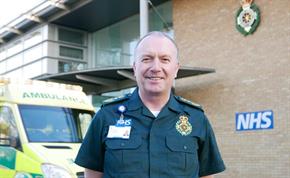
The NHS staff survey results were published this week and it was great to see the improvements we have made, especially in staff engagement and motivation scores and with more people recommending EEAST as a place to work or receive treatment. This aligns with the reduction in staff attrition we are seeing in recent months.
You can find out more about the results here and Ruth McCall, interim Director of HR will be leading on the development of an action plan so we can make further improvements. Thank you to everyone who took the time to take part; your feedback will make a difference.
We are also holding our second staff engagement forum on Thursday, 10th March. This is another opportunity for you to engage on some of the big ticket items we face including the cultural audit, changing our operating model and the forthcoming CQC visit. To apply for a place simply email EEASTevents@eastamb.nhs.uk providing your job title, area of the Trust you work in (for example, PTS) and if you have any dietary or other requirements. For more information click here.
The feedback you give us is helping shape our plans for the future and we have already put in place some quick wins, which you can find out about at the staff engagement forum on the 10th March. However, it is really important that we all feedback, and respond, to colleagues when they raise an issue. This is particularly important when someone raises an issue on Datix –they need to know what we have done about it; so please can I urge all managers that when you close an incident you provide feedback to the person who reported it.
We are also working with the CQC to set up a number of staff focus groups – we want you to have the opportunity to share directly with the CQC what’s good about working at EEAST, the quality of our patient care and areas that need improving. For further details about these please click here, but we are hoping that we can get up to 300 staff involved in these focus groups with the CQC.
You have also highlighted the issues around 111 referrals and the significant frustration this can cause. We continue to raise the impact of such calls with 111 providers and our commissioners. The Association of Ambulance Chief Executives (AACE) is also making the case concerning rules around how 111 calls that are referred into the 999 service can be better managed and I hope we will have some good news in the not too distant future.
Going forward, we need to change our model so that there is far more integration across the 999, 111, GP out of hours and other healthcare services. Key to this is EEAST being in a position to bid and win 111 and GP out of hours contracts; that way we can better manage demand and provide the best and most appropriate response to patients be that advice over the phone, referral to another healthcare service or sending a clinical response.
A model whereby services are more integrated, ambulance staff provide more clinical expertise over the phone or in the home and access to other healthcare pathways is better and more appropriate for a significant percentage of our patients. This approach, which is being implemented by the majority of English Ambulance Trusts, aligns with the NHS vision for urgent and emergency care services of the future. We want to be at the heart of that network which is why we are developing a new operating model that will make the organisation fit for the future and provide opportunities for many staff to develop their careers.
Our performance against national response time targets remains challenged, due to increases in demand, acuity of our patients, hospital handover delays and student abstractions. Whilst I continue to encourage partners to move ambulance targets to be focussed on clinical outcomes for patients rather than simply time response, we are currently funded and measured against time responses.
We are also working with our fire and police colleagues to explore how we can increase our reach and response to the most life critical patients. We are hoping to launch some co-responding trials from April and we will bring you more news on this as plans develop.
Regrettably, the significant volume of students in our system, together with the lack of structured deployment has created a tremendous challenge to manage abstraction and mentoring arrangements. While this challenge has been foreseeable for the last 18 months, the reality is that it is truly upon us and really stretching some areas more than others.
To mitigate the significant loss of capacity, we are utilising more private ambulance service provision to increase our capacity whilst cohorts of our student paramedics complete the next phase of their training and education. We have also explored the temporary use of agency paramedics and will be deploying the numbers we find appropriate with a longer term view to encourage them to join us as employees.
Essentially, we are under enormous pressure to improve our performance and increase capacity, but I wanted to reassure you that we will not be supporting any action that defers students from completing their studies – we have learned from the Trust’s past mistakes.
Have a good week,
Robert
Published 25th February, 2016